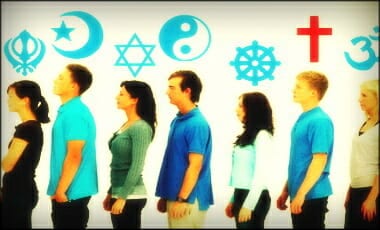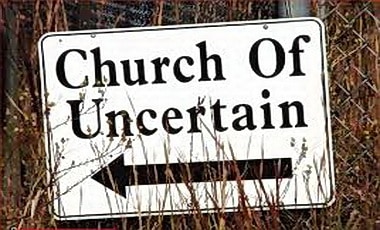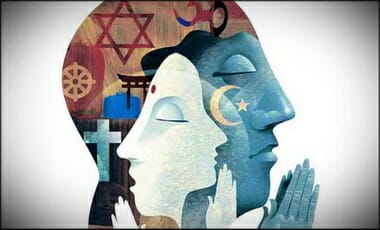Eastern religions are considered in relationship to biblical faith with apologist Dr. Douglas Groothuis of Denver Theological Seminary. We take a look at Christianity, Hinduism, and Buddhism in terms of how they view ultimate reality, the human condition, spiritual liberation and more. His “Christian Apologetics: A Comprehensive Case for Biblical Faith” is a one stop hop for the apologetic enthusiast.
Judeo-Christian Worldview


Caller: Roe v Wade at His Synagogue (Dennis Prager)
A caller notes his experience the day after the Supreme Court announced their Federalist ruling at his synagogue. Dennis Prager makes a great argument from our [pro-life] point of view. I have used a similar “extreme” example to counter the Left’s extreme examples, but a “well-ta-do” family with the means to care and raise the child is a good one as well… uses the Left’s argument of “poor” persons with no means of caring for said child and turning the argument around on them.
This is the quote I always use:
- “If homosexuality is really genetic, we may soon be able to tell if a fetus is predisposed to homosexuality, in which case many parents might choose to abort it. Will gay rights activists continue to support abortion rights if this occurs?”
Dale A. Berryhill, The Liberal Contradiction: How Contemporary Liberalism Violates Its Own Principles and Endangers Its Own Goals (Lafayette, LA: Vital Issues Press, 1994), 172.
[BTW, this was the first book I read that made excellent arguments using the Left’s positions to show just how vacuous their stance was.]
Even well-known atheists GET IT. And the BIBLE IS CLEAR in the Old Testament about the issue.
IF YOU WANT TO WATCH THE VIDEO IN HD, CLICK THE GEAR AT THE BOTTOM OF THE VIDEO AND CHOOSE 1080P

The Cost of Materialism (Nihilism)
Hat-tip to EVOLUTION NEWS & SCIENCE TODAY for this.
The role played by the Judeo-Christian tradition in the rise of Western science is a contentious topic — but not an obviously emotional one. Or so you might think. Stephen Meyer spoke on the subject at our most recent Dallas Conference on Science and Faith. The video is up now. In a new presentation using the story of Isaac Newton and his investigation of the nature of gravitation as a case study, Meyer recalls an earlier talk he gave at the Dallas Conference on related themes where a young woman, a member of the video crew, broke down in tears as Steve spoke. She later confessed in a communication to us:
Throughout my college career, professors would constantly lecture that based on the evidence they had provided…there should be no way that anyone in the class could believe in God. They’d argue that the science was proven… and God was hence a myth. I was not equipped to present a valid opposition in a debate. I was desperate to find a commonality between my beliefs and my [scientific] education. [Emphasis added.]
“Desperate” is a remarkable word. How many young people are being educated to believe that thinking scientifically means discarding a relationship with God?
[….]
As these comments suggest, the nihilism that is being sown by materialism is not just an intellectual problem. The desperation that goes with it cuts to the heart of many people. If you have children in college, as I do, it’s a very scary thing. Many thanks to Steve Meyer for tackling the science-versus-faith “warfare” myth directly. One viewer notes that he sent the lecture to his “agnostic brother” who is “really into the sciences.” Good idea.
Bestselling author Stephen Meyer explores how three key Judeo-Christian presuppositions encouraged the rise of modern science, and he explores the influence of faith on the life and work of Sir Isaac Newton. Meyer is Director of the Center for Science and Culture at Discovery Institute and author of Return of the God Hypothesis. This talk was presented at the 2022 Dallas Conference on Science and Faith in January 2022.

A Facebook Meme About the Soul
A friend posted the picture and statement regarding the soul… I thought it an opportunity to respond, here.
I SORTA agree with that statement in the pic. While the picture is riveting, and I believe in the soul… I assume many who do not adhere to the Judeo-Christian philosophy do not, or do not realize well WHAT they believe. I will explain. All of the world’s 10,000+ religions break down into seven worldviews at most…
WORLDVIEW DEFINED QUICKLEY
- The German word is WELTANSCHAUUNG, meaning a ‘world and life view,’ or ‘a paradigm.’ It is a framework through which or by which one makes sense of the data of life. A worldview makes a world of difference in one’s view of God, origins, evil, human nature, values, and destiny” A worldview consists of a series of assumptions/presuppositions that a person holds about reality. A worldview, consciously or subconsciously, affects the way a person evaluates every aspect of reality. Every person adheres to some sort of worldview, although one person may not be as consciously aware of it as another person. These presuppositions affect the thinking of every person in the world. It logically follows that the way a person thinks affects what a person does. (I have more on this in my 1st chapter of my book — as well as my WORLDVIEW post)
…. Theism (Jews and Christians as an example); Poly-Theism (Mormons); Finite Godism (Witches, New Age, etc); Naturalism (Atheists); Pantheism (Hinduism, Janism, Buddhism, etc); Panenthiesm (Western mysticism [New Age] – and Hindu bhakti, etc).
While many have a belief in the soul, the only worldview that holds the “self” resides in and continues on ?? the soul is Theism. While neo-Pagans (like Wiccans) believe the soul goes through reincarnations – similar in some respect to Pantheists – in the end, we see that all this we experience is an illusion. Here, for instance, is a conversation I had with a ZEN apologist (this is taken from my 2nd chapter in my book):
MY INITIAL ENGAGEMENT:
Does the idea of “violence” as a moral good or a moral evil truly exist in the Buddhist mindset? What I mean is that according to a major school of Buddhism, isn’t there a denial that distinctions exist in reality… that separate “selves” is really a false perception? Language is considered something the Buddhist must get beyond because it serves as a tool that creates and makes these apparently illusory distinctions more grounded, or rooted in “our” psyche. For instance, the statement that “all statements are empty of meaning,” would almost be self refuting, because, that statement — then — would be meaningless. So how can one go from that teaching inherent to Buddhistic thought and say that self-defense (and using WWII as an example) is really meaningful. Isn’t the [Dalai] Lama drawing distinction by assuming the reality of Aristotelian logic in his responses to questions? (He used at least three Laws of Logic [thus, drawing distinctions using Western principles]: The Law of Contradiction; the Law of Excluded Middle; and the Law of Identity.) Curious.
THEY CALL HIM JAMES URE, RESPONDS:
You’re right that language is just a tool and in the end a useless one at that but It’s important to be able run a blog. That or teach people the particulars of the religion. It’s like a lamp needed to make your way through the dark until you reach the lighthouse (Enlightenment, Nirvana, etc.) Then of course the lamp is no longer useful unless you have taken the vow to teach others. Which in my analogy is returning into the dark to bring your brothers and sisters along (via the lamp-i.e. language) to the lighthouse (enlightenment, Nirvana, etc.)
I RESPOND:
Then… if reality is ultimately characterless and distinctionless, then the distinction between being enlightened and unenlightened is ultimately an illusion and reality is ultimately unreal. Whom is doing the leading? Leading to what? These still are distinctions being made, that is: “between knowing you are enlightened and not knowing you are enlightened.” In the Diamond Sutra, ultimately, the Bodhisattva loves no one, since no one exists and the Bodhisattva knows this:
- “All beings must I lead to Nirvana, into the Realm of Nirvana which leaves nothing behind; and yet, after beings have been led to Nirvana, no being at all has been led to Nirvana. And why? If in a Bodhisattva the notion of a “being” should take place, he could not be called a “Bodhi-being.” And likewise if the notion of a soul, or a person should take place in him.
So even the act of loving others, therefore, is inconsistent with what is taught in the Buddhistic worldview, because there is “no one to love.” This is shown quite well (this self-refuting aspect of Buddhism) in the book, The Lotus and the Cross: Jesus Talks with Buddha. A book I recommend with love, from a worldview that can use the word love well. One writer puts it thusly: “When human existence is blown out, nothing real disappears because life itself is an illusion. Nirvana is neither a re-absorption into an eternal Ultimate Reality, nor the annihilation of a self, because there is no self to annihilate. It is rather an annihilation of the illusion of an existing self. Nirvana is a state of supreme bliss and freedom without any subject left to experience it.”
MY FINAL RESPONSE AFETR NO RESPONSE
I haven’t seen a response yet. Which is fitting… because whom would be responding to whom? Put another way, would there be one mind trying to actively convince the other mind that no minds exist at all?
Here’s another way to see the same thing, Dan Story weighs in again:
- It may be possible that nothing exists. However, it is impossible to demonstrate that nothing exists because to do so would be to deny our own existence. We must exist in order to affirm that reality doesn’t exist. To claim that reality is an illusion is logically impossible because it also requires claiming that the claim itself is unreal—a self-defeating statement. If reality is an illusion, how do we know that pantheism isn’t an illusion too?
[The above beliefs found in neo-Pagan, Pantheism, Panentheism affects the idea of “beauty” as well]
So many belief systems struggle with the reality of a soul of a “person.” People who just believe it to be the case live in the West and have been influenced through Western culture that has come through the stream of Jerusalem, Athens, and Rome.
In other words, for someone to say “if they could see the soul” are assuming a Judeo-Christian construct that they may not adhere to. They are “borrowing” something that they like from one religion and “quilting it together” illogically with another belief. The two cancel each-other out. Logically speaking.
It SOUNDS nice though.

“Amen” and “A Woman” | Crazy Democrats
(WIKI) Amen (Hebrew: אָמֵן, ‘ʾāmēn’; Greek: ἀμήν, ‘amín’; Arabic: آمین, ‘āmīna’; Aramaic/Syriac: ܐܵܡܝܼܢ, ‘ʾāmīn’) is an Abrahamic declaration of affirmation first found in the Hebrew Bible, and subsequently in the New Testament. It is used in Jewish, Christian and Islamic worship, as a concluding word, or as a response to a prayer. Common English translations of the word amen include “verily”, “truly”, and “so be it”. It is also used colloquially, to express strong agreement.
[….]
The usage of amen, meaning “so be it” (as found in the early scriptures of the Bible), is a word of Biblical Hebrew origin. The word originated in the Hebrew Scriptures, as a confirmatory response; it is found in Deuteronomy as a confirmatory response made by the people. Moreover, in the Books of Chronicles (16:36), it is indicated that around 1000 BC, the word was used in its religious sense, with the people responding “Amen” upon hearing the blessing, “Blessed be the Lord God of Israel from now and unto all eternity”. The basic triconsonantal root from which the word is derived, is common to a number of languages in the Semitic branch of the Afroasiatic languages, including biblical Aramaic. The word was imported into the Greek from the Judaism of the early Church. From Greek, amen entered the other Western languages. According to a standard dictionary etymology, amen passed from Greek into Late Latin, and thence into English. Rabbinic scholars from medieval France believed the standard Hebrew word for faith emuna comes from the root amen. Although in English transliteration they look different, they are both from the root aleph-mem-nun. That is, the Hebrew word amen derives from the same ancient triliteral Hebrew root as does the verb ʾāmán.
Grammarians frequently list ʾāmán under its three consonants (aleph-mem-nun), which are identical to those of ʾāmēn (note that the Hebrew letter א aleph represents a glottal stop sound, which functions as a consonant in the morphology of Hebrew). This triliteral root means to be firm, confirmed, reliable, faithful, have faith, believe.
Charlotte, NC — To open each Congressional session, a prayer is said. At the start of a new Congress, a prayer is said for that specific Congress. This year, the prayer was said, but it was a complete slap in the face to our founding fathers and our nation’s history.
Rep. Emanuel Cleaver (D-Mo) opened the session in prayer. Cleaver was a United Methodist Pastor and the prayer did not deviate far from normal until he was near the end of his prayer.
Cleaver said he was praying to the monotheistic God, Brahma the Hindu god, and God known by many different names by many different faiths. It’s a significant departure for a nation that was founded on Judeo-Christian faith. But that’s not all.
To conclude his prayer, Cleaver apparently thought he was going to pray gender-neutral and said the words Amen and a woman. You can see his comments below and the Washington Examiner does a great job sharing that the word amen is not a reference to masculinity, but rather a word that translates “so be it.”…..
Here is the video:
DAILY WIRE great commentary:
….The first explanation for the bizarre expansion of “amen” to “amen and a woman” could be that Rep. Cleaver is simply guilty of appalling ignorance. However, given that Cleaver served as the pastor of St. James United Methodist Church in Kansas City, Missouri, from 1972 to 2009, it seems difficult to believe that such a statement can be chalked up to irreligious stupidity. Surely, after almost 40 years in the profession, Cleaver would know that “amen” doesn’t mean “a man?”
Then, what is to blame? The answer, quite obviously, is the absurd gender politics which have taken root at the heart of progressivism. After all, House Speaker Nancy Pelosi has “proposed eliminating references to gender and establishing an Office of Diversity and Inclusion in the House.” Like Pelosi’s actions, could Cleaver’s laughable inclusion of “a woman” be another example of a pre-radical Democrat trying to survive in this new radical world?
Regardless of whether or not Cleaver is a true believer, what should cause further concern for conservatives — beyond the inaccuracy of Cleaver’s redefinition or his blatant pandering — is that his prayer demonstrates how nothing is safe when it comes to the new and fluid demands of the radical Left.
Long gone are the days of “Chairperson” replacing “Chairman” or “Chairwoman.” Similarly, long gone are the days of meaningless linguistic inventions such as “Latinx” or “womxn.” The radical Left’s lust for cultural dominance is never satisfied, and their appetite has been forced to grow more refined as their targets become harder to identify.
The scary part is not the absurdity of the radical Left or their fundamental premises — these have always been nonsensical — but the continued enthusiasm of those held hostage, forced to bow to their ever-changing demands. Even a pastor, an apparently religious man who presumably respects the words and meaning of scripture, is happy to bastardize language in order to survive another day.
It is this detail which should remind conservatives that the battle for language is more important than ever before. This “prayer” represents far more than ignorance or meaningless pandering. It shows that even religion — the one last entity which transcends the power of “the state” — has fallen into the cross-hairs of a radical Left who hope to dominate our language in their quest for power.
It’s not enough that we laugh at the absurdity of “amen and a woman.” It’s time we realized that the cultural battle is being fought on yet another front.
This sparked some responses
MY FACEBOOK:
What kind of a woke moron ends a prayer with “amen and awoman”? Amen is Latin for “so be it.” … ohhh… a Democrat.
Cleaver ended his prayer to open up the 117th Congress on Sunday with the words “amen and awoman.”
Video of the prayer’s ending was posted to Twitter by Republican Pennsylvania Rep. Guy Reschenthaler, who pointed out that the word “amen” is Latin for “so be it.”
“It’s not a gendered word,” Reschenthaler wrote. “Unfortunately, facts are irrelevant to progressives. Unbelievable.”…..
BEN SHAPIRO + CLIFFORD D. MAY
THE O.T. via JERRY ADAMS
SOME APOLOGETICS
SEE ALSO:

If There Is No God, Murder Isn’t Wrong (PragerU)
If there is no God, murder isn’t wrong. You may think it’s wrong, but how do you know it’s wrong? As Dennis Prager explains, without God, all morality is mere opinion.

